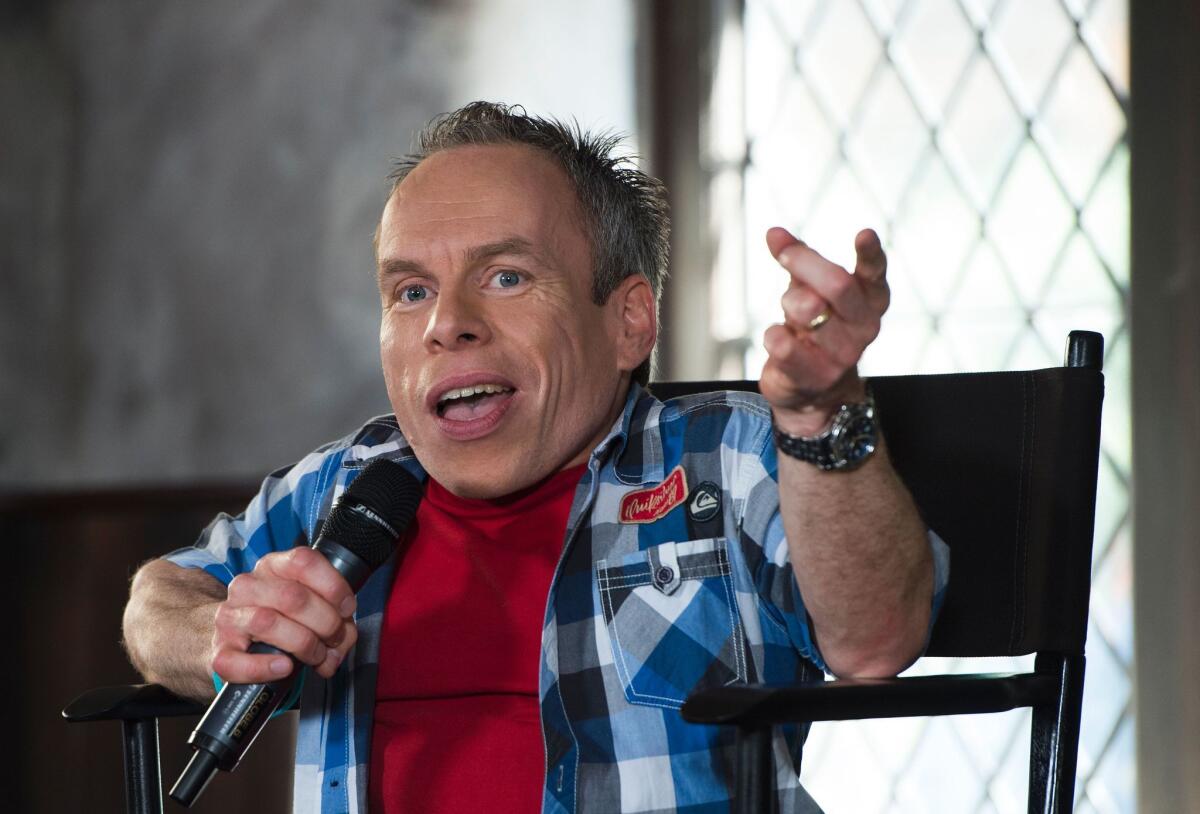Warwick Davis breaks down what it’s like to work on three generations of ‘Star Wars’ movies

- Share via
At the early age of 11, Warwick Davis was cast as a young Ewok named Wicket in “Star Wars: Return of the Jedi.” The furry little creature, who helped Princess Leia find shelter in the forest moon of Endor, would find popularity among fans and spur two Ewok-centric “Star Wars” spinoff movies.
And the skills of Davis would result in his return to the “Star Wars” franchise two more times, but as different characters. Making Davis a bit of an expert on the evolution of “Star Wars” and how different directors have crafted and steered the vision from “Jedi’s” Richard Marquand to today’s J.J. Abrams.
FULL COVERAGE: More ‘Star Wars’ news
While taking in the sites at another mega-watt franchise establishment, the Los Angeles opening of the Wizarding World of Harry Potter at Universal Studios in California, Davis spoke to The Times and ran down how each director forever altered the way we view the galaxy far, far away.
What did it feel like at the age of 11, booking “Return of the Jedi”? Did you know it was going to be a huge movie?
Warwick Davis: I knew, because I was a fan of ‘Star Wars.” When I was 7 I went to see “Star Wars” and then to be in one of those films when I was 11. I was in awe of my on-screen heroes. Carrie Fisher was not Carrie Fisher, she was Princess Leia. I used to call her Leia. Han and Luke, I would hang out with them between takes and chat with them.
I managed to suspend my disbelief, even though I knew there were cameras and there were lights, for me, I still was able to believe in it as being real.
You’ve worked with three different directors in the “Star Wars” world. What’s the difference between each one?
They’re all very different. Richard Marquand, who directed “Return of the Jedi,” a very gentle man, perfect for me as an 11-year-old, because he allowed me to be the character. I wasn’t given any specifics. We had some Ewok training, which is more about fitness training and how to work in a very hot costume, quite an awkward costume, but then it was down to me to interpret what this character might do, and I used to just not really listen to any particular discipline of being in a shot. I would just think, “I’m going to go look at that droid over there,” that R2-D2 in this shot. And I would just wander off and have a look at, and then they’d be like, “Quick, get the camera over there. Let’s capture this moment,” so I was kind of directing it myself, in a sense, and they were just capturing it. Richard was great for allowing me to do that.
Nowadays, you lose all that. As you become a mature actor, you kind of lose all that, probably. George Lucas is a director who directed the prequels, and again, George trusts you to bring the character to the screen, so he’s not going to give you specifics. It’s just like, “Start over there, finish about there, and whatever you decide to do with that is your choice.”
Making the prequels was an interesting experience, because nothing existed. It was green screen all around. They created a very limited amount of set, certainly in the things I was involved with, so a lot was left to our imaginations as actors. “There’s going to be a huge ship over. You’re going to be leading a creature here with these imaginary reins that you’re holding.”
Wait, the reins weren’t even real?
No, I would have thought they would give me them on to hold on a pole. But I’m grabbing something that didn’t exist, and leading something that didn’t exist. You have to become a child again in order to picture all this stuff.
Then, J.J. Abrams, what a lovely man. He’s a “Star Wars” fan. We shared “Star Wars” memories, which was a lovely experience to do. One of my most vivid memories from “Episode VII” was being in my creature suit, which I had very limited vision, in fact just a kind of pinhole vision in one area which I could just catch a glimpse of things, and I remember, before one take, I just caught a glimpse of the clapper board. And it’s not the traditional kind of scrawled on with chalk. It’s a kind of perspex board, and engraved on it is the “Star Wars” logo, beautifully done.
All I, through this little pinhole of my vision, I caught a glimpse of this “Star Wars” logo on the clapper board, and suddenly it hit home what we were doing. We were making the next “Star Wars” movie, the one that people had been anticipating since the last “Star Wars” movie, and the one we never thought we’d see. We never thought we’d see sequels beyond “Episode VI.” It was a cool moment.
All of them great directors, all of them quite different, all of them kind of working to the same goal, creating brilliant entertainment for people and leaving a legacy, I suppose.
What do you think about Rian Johnson [current director of Episode VIII].
What do I think about Rian? Great writer-director, anyway. I love the stuff he’s done. He’ll bring his own take to this. But I think these guys, they understand “Star Wars.” I don’t know for sure, but I’m sure Rian will be a fan himself of “Star Wars,” and they have great responsibility. I wouldn’t like to be a director of a “Star Wars” movie. Imagine the responsibility that you have to kind of deliver, and the expectation that there is. The same for Gareth Edwards, who’s directed “Rogue One.” Again, I love Gareth Edwards work. His previous work’s fantastic, so I’m really excited to see what he does with “Star Wars.”
MORE:
‘Star Wars’ documentary ‘Elstree 1976’ shines a spotlight on the unsung: The extras
Oscar Isaac on ‘Star Wars: Episode VIII’: ‘It feels like we’re making an independent film’
‘Lego Star Wars: The Force Awakens’ reveals what happened before ‘Episode VII’
More to Read
The biggest entertainment stories
Get our big stories about Hollywood, film, television, music, arts, culture and more right in your inbox as soon as they publish.
You may occasionally receive promotional content from the Los Angeles Times.











